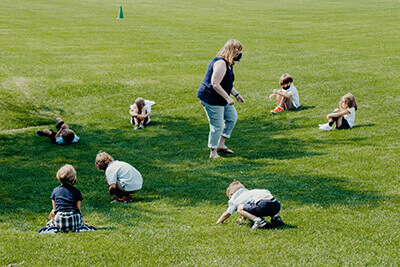August 27, 2020
 by Dr. Bill Hudson, Head of School
by Dr. Bill Hudson, Head of School
Yesterday was amazing! After months apart, it was heartwarming to welcome our students to a new school year, in person. Excitement and joy were evident throughout the day, from drop off to dismissal. Although there were no hugs due to our health and safety measures, I observed an abundance of virtual hugs, pretend high fives, and no-contact fist “bumps.” As someone who worked in an empty building for the last six months, the joy and laughter emanating from our students lifted my spirits and soothed my soul.
In the midst of a pandemic and opening school in a wholly different way, it’s comforting to see that this crisis isn’t driving people apart, it is bringing them together. As a part of my summer reading, I was struck by the timeliness of “Humankind: A Hopeful History,” a new book by historian Rutger Bregman. Bregman set out to prove “that humans are hardwired for kindness, geared towards cooperative rather than competition, and more inclined to trust one another than distrust one another.”
Bregman posits that, at our core, humans are decidedly good. In fact, is the very trait of friendliness that gives us an evolutionary advantage over other species. One of the most fascinating insights from modern anthropology and biology is that human beings have been selected over the history of our evolution to be friendly. Throughout history, it was actually the friendliest among us who had the most kids, and so had the best chance of passing on their genes to the next generation.
One of the primary tasks in the first few days of school for teachers is to get to know their students. In debriefing the day, you may hear from a young student that they had fun and did nothing but played games. From older students, you might hear that all we did is introduce ourselves to one another or listen to the teacher talk about the class. Behind the scenes, however, teachers are deliberately laying the groundwork to foster strong, personal relationships.
At MPA, the first days of school are more than just learning names. We know, from both experience and research, that forging strong, personal relationships with students lead to higher student achievement, greater student engagement, fewer disruptive behaviors, and lower anxiety. Cultivating deep relationships provide teachers with awareness of a student’s potential, their interests, their challenges, and their strengths. Over time, that knowledge and awareness only deepen.
I’ve worked in a number of schools, even conducted a national research and published a report on school community, and fiercely believe in the power of relationships between students and their teachers and other adults and their role in building a positive school culture. With all honesty and humility, I can honestly say that I’ve never seen a school like MPA in that regard. So while content may take a back seat these first few days of school, the strong foundation that is being built will be lasting.